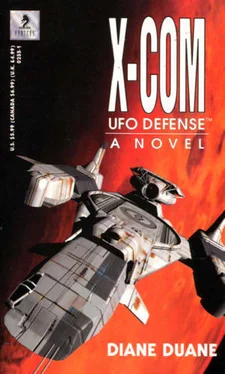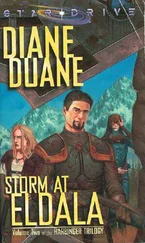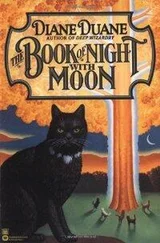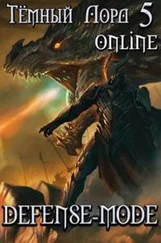“Haven’t missed much here, have you?” Jonelle said, admiringly. “Ambitious, to say the least. What am I supposed to mortgage to afford all these scientists and researchers, Jim?”
“Well, nothing much, Commander,” Trenchard said. “If you look at the costing analyses on the back few pages— that’s right.” Jonelle turned to them and found herself looking at a very professional estimate of the next two years’ earnings at Andermatt, based on her first thirteen months at Irhil M’Goun, and showing estimated growth of the new base’s income and ways in which part of that income could be used to fund the new researches.
“If I didn’t know better,” Jonelle said, “I’d think you’d been bribing my secretary for these figures.”
“Hardly any need for that, Commander,” Trenchard said, sitting back in his typing chair and stretching a little. “It’s common knowledge in the base what comes in over a given week, in terms of Elerium and alien alloys and so forth. Notice that nothing much is said about outgoings.” He smiled slightly. “Not my table, so to speak. But the market values of these things are all well enough known.”
She nodded, put the sheaf of papers down. “I’ll look these over in more detail…but if you’re as effective at Andermatt as you have been down here, I’m hardly going to quibble. Who are you recommending I leave handling the supervision of research down here?”
He looked a little shocked. “I’d hoped to manage both ends myself, Commander. There are things going on down here I’d hate to have to drop in the middle. My research assistants are OK, I suppose, but….”
“All right, all right!” she said, and chuckled a little, for he was starting to talk faster and faster, always a bad sign. “Look, Jim. Are you sure you can handle a load like that? I’d hate to have the researches down here wind up getting slighted while you’re getting the Andermatt end of things up to speed.”
He let out a long breath, then grinned a little. “It’s always hard to let go, isn’t it?” Trenchard said. “I’ll reassess, if you like. But truly, Commander, I think I can manage. I’ll have to delegate a little more at this end, is all.”
“Good man,” Jonelle said and glanced around the walls again. “So let me take this ‘home’ and look at it. Meanwhile, how’s your own work going? The business I interrupted you in the other night.”
“Pretty well. A lot more raw material to work with, lately, thanks to the colonel.”
“Enough for your uses?”
Trenchard laughed a little ruefully. “I’m not sure a whole planetful would be enough…. Well, maybe it would…but it would still leave me with unanswered questions, I’m sure. The line of investigation I’ve been pursuing, the question of energy transport to and from the cells of the Ethereals’ bodies, and specifically into and out of their brains, is probably going to elude us for a good while yet. The trouble is that you need to have clearly formulated questions to ‘ask’ the research material, and finding the right questions to ask….” He sighed. “The ones I’m stuck with right now are fairly general.”
“Such as?”
“Well, the biologist’s basic one, when looking at any new species. What do you have to do to a species, in the evolutionary sense, to make it turn out this way? That’s the one that usually gives you a sense of where to start work, depending on your intentions toward the species in general—whether you want to help it be more efficient, or stop it, kill it. What trials, what twists and turns in its home environment, what disasters or encroachments from other species, can cause the changes from whatever the original form was to what you see before you? And how do those changes reflect on its life cycle now?”
Trenchard reached into a drawer and came up with a Toblerone bar, offering it to Jonelle. She shook her head. Trenchard nodded, then broke off a chunk himself. “There’s a theory that’s made the rounds,” he said, more or less around the chocolate, “that the Ethereals might be a more evolved form of the Sectoid.”
Jonelle had heard the theory but had no idea how much truth there might be behind it. “Have you found any proof that that might actually be the case?”
“Well, not proof as such. But there are similarities. Certainly the Sectoid evolution seems to be selecting some of its organic systems out, dumping them by the wayside. Already they hardly have a digestive tract to speak of. Certainly their kidnapping of humans for genetic-engineering experimentation suggests that they’re starting to take a hand in their own evolution, these days, looking for human genes that will recombine successfully with their own, and one of their main interests has seemed to be in vascular genetics. Maybe the circulatory system is the next one they’re thinking about getting rid of. Or maybe it’s something else entirely.”
Trenchard broke off another piece of Toblerone and looked thoughtful. “Whatever else can be said about this kind of minimalist approach to physiology, though, it may have its points. Look at the Ethereals. We’re still struggling to understand what makes them go. I probably know more about the subject than all but three or four other people on the planet, and I’m seriously confused —expect to be for years. But Ethereals survive. There’s almost nothing to them, yet they are incredibly resistant to our weapons. There’s no way to tell how long their lifespans might be—except that I doubt they’re very short— and the sheer power of their minds is incredible. Maybe less is more. Maybe this is something we should be looking at for humans.”
He went on munching. “I mean, we come back, eventually, to the question: what do you do to a species so that it turns out like this? Interrogation of Ethereals is an iffy business, you know that, but when we press them about where they come from, we keep getting this image or tangential description of somewhere dim and red, very cold, empty… Suppose their homeworld is circling a very old star? One that’s way down the stellar classes, an N or R, mostly cooling gases. It would take a long time for a change like that to set in, and if the dominant species on the planet were sufficiently advanced, it could start making changes in itself so as to be able to survive…dumping the systems it doesn’t need. As the homeworld starts to die along with the primary, suppose the intelligent species starts killing off the parts of itself it can no longer support? No more food? Easy: find some other means of energy transport to the body’s cells, and kill off the digestive system once you don’t need it any more. No more heat? Again, find another energy source and method of transport for it—maybe something like electromagnetic or gravitational fields. The same for light—engineer a new kind of sensorium, get rid of the old one. Even air, eventually—the earlier changes I’ve described would make respiration redundant, anyway.”
“A creature so changed,” Jonelle said, “wouldn’t bear much likeness at all to its parent species.”
“No. But it would have survived…and in this universe, anyway, survival is what counts. What hasn’t survived doesn’t count any more.” Trenchard looked at the Toblerone bar, and his hands. “Now look at that—it’s all over me. How can such tidy people produce such messy food?” He dropped the bar back in its drawer, then came up with a tissue.
“The thing is,” said Trenchard, “our own Sun will do that eventually, if it doesn’t just go nova—which isn’t very likely. Stars in its part of the main sequence rarely go to the trouble. A long, slow cooldown is more likely, after some initial flares. If humanity is to survive such a fate—which we might not—then we’re going to have to change the physiology itself to survive. We might end up doing something very like what the Ethereals have done.” “If we did,” Jonelle said, “would we still be human?” “Depends on your definition of humanity,” Trenchard said, chucking the tissue in the wastepaper basket. “But at least we’d be alive. We would have bought ourselves time to find a way to be human somewhere else—or right where we were. Even now, being human isn’t what it was ten thousand years ago, or twenty, or fifty. We have been doing genetic engineering on ourselves, directly or indirectly, by populations pushing one another around, intermarrying, wiping one another out, over thousands of years. And we’ve been doing it to all the other species we’ve been able to get our hands on, for thousands of years already. Bacteria, for example: some domesticated to our use—like the ones that make cheese and wine— others destroyed, like smallpox, or bred to be more infectious, like biological warfare agents. Sometimes we’ve done it accidentally—look at the way the AIDS virus and the tubercle bacillus have potentiated one another, creating more dangerous kinds of TB. Think of domestic cattle, pigs, sheep, you name it, all bred by us from the original limited wild species, the desired traits kept, the undesirable ones culled. That’s genetic engineering—just the kind you don’t need microsurgery for. Six hundred species of dog, all bred by us from one common ancestor, but are any of them less dogs for all that?”
Читать дальше











